Everything in the Garden Read online
Contents
Title Page
Dedication
Acknowledgements
Chapter 1
Chapter 2
Chapter 3
Chapter 4
Chapter 5
Chapter 6
Chapter 7
Chapter 8
Chapter 9
Chapter 10
Chapter 11
Chapter 12
Chapter 13
Chapter 14
Chapter 15
Chapter 16
Chapter 17
Chapter 18
Chapter 19
Chapter 20
Chapter 21
Chapter 22
Chapter 23
Chapter 24
Chapter 25
Chapter 26
Chapter 27
Chapter 28
Chapter 29
Chapter 30
Chapter 31
About Honno
Copyright
Everything in the Garden
by
JO VERITY
HONNO MODERN FICTION
For my father
Ken Evans
1909 – 2003
Acknowledgements
Thanks to Honno and the Welsh Books Council for their confidence and support; Elin ap Hywel, my gentle editor; Cardiff Writers’ Circle for listening and advising; And my family for making me feel like a proper writer.
1
Anna took the letters from Len. He hovered, waiting for her to open them. She glanced at the hand-written envelopes and pushed them deep into the pocket of her overalls. The postman, disappointed, climbed back into his battered van and, with a blast on the horn, disappeared down the drive. She had planned to spend the morning working in the vegetable garden and didn’t want anything to spoil it. The trouble was, it had already been spoiled. Seeing the envelopes had done that.
She walked across the yard to the outbuildings. Anna and Tom had claimed the one on the end. Inside it was gloomy and smelled of uncured concrete and white spirit; a masculine smell. The one small window, set deep in the thick wall, allowed a shaft of sunlight to paint a rhombus on the uneven floor. Tom had concocted a wooden rack from a floorboard, salvaged when the builders were in, doing the conversion work on the old farmhouse. He’d fixed this board to the rough stone wall, then inserted pairs of wooden pegs to hold his tools, head up, dangling. He graded them by length of handle so that they looked like a family standing to attention in the shadows. She lifted down a rake and took a trowel, a line and a pair of leather gardening gloves from the smaller items neatly stacked on open shelves, dropping them into a black bucket.
Leaving the outhouse, she skirted the swimming pool. A couple of inches of water stood in the deep end, where it had rained a few days earlier. Through the winter, a tarpaulin had kept the rain and leaves out but now it lay, like a beached whale, at the side of the pool.
The vegetable garden was divided into four equal plots, three of which were covered with grass and dandelions. Here and there a currant bush or rhubarb crown hinted at what had once been. Tom had double-dug their quadrant last autumn. While the others were inside, painting and decorating, he’d been getting ahead of the weather. Then the winter frosts had played their part, breaking the clods down to a fine tilth. The purple sprouting broccoli plants, although planted later than Anna would have liked, had flourished, giving the first indication that the soil was fertile.
She worked down the rows, nipping off the purple florets and dropping them into the bucket. The crop was tailing off now. The scruffy, wind-scorched plants leaned at crazy angles but there was plenty for everyone. If their section of the garden could produce such abundance, they could all be self sufficient in organic vegetables within twelve months. The snag was that the others were showing little interest. They thanked her for the greens each time she distributed them but, on the last occasion, she was sure she heard Jenny groan. She had checked, once or twice, to see whether they were finding their way straight into the dustbin. Tom had pointed out that there were plenty of other ways of disposing of unwanted broccoli. Anna wasn’t always sure where Tom stood.
She stretched the line across the dark soil and made a shallow trench with the corner of the rake head. From the pocket not containing the letters, she took a packet of seeds. The picture on the front showed a bunch of carrots, straight and unblemished, unlike any carrots that she’d ever grown. Every year she was taken in by such promises of perfection and every year she harvested misshapen vegetables, pockmarked with insect nibblings. But they were tasty and free from chemicals and they set her firmly in the season, something she missed when she bought her vegetables from a supermarket. She shook the packet, hearing the rattle of the seeds, each bearing its blueprint of colour, taste and smell. The very essence of carrot. She didn’t dare think too hard about such things or gardening became a religious experience and she was, on the whole, anti-religion.
This was the best moment of all – trickling the dry seeds into the soil. She abandoned the gloves. They put a thick skin between her and real life. People often commented on her ‘capable hands’ and she took this to be a compliment. She wore her square nails, often harbouring traces of soil or clay, as a badge of honour. In her book, manicured nails were evidence of inactivity.
She tore the corner off the packet and tipped the seeds into the palm of her hand. Bending low over the soil, she moved along the row, sprinkling them evenly into the shallow drill. Some of her hair had escaped from the tortoiseshell combs which pulled the tangle of curls back from her face. She was hot and beginning to sweat. Wisps of hair corkscrewed, dampened by the moisture on her neck and forehead, and her nose started to run. When she fished in her pocket for a tissue, the letters were there, waiting to invade her meditation. Two time bombs, bearing her name. She folded the soil over the seeds and tamped it down with the flat of the rake and, as she did so, the smell of leaf mould rose from the disturbed soil. She found a stout twig to mark the row and jammed the empty seed packet onto it. By the time the picture had faded, they would be eating the real thing.
It was not yet eleven o’clock. She’d left Tom at his drawing board, working on a barn conversion for one of the farmers who lived further down the valley and he had made it clear that he didn’t want to be disturbed. There were several cars in the yard but little sign of life, apart from the washing on one of the rotary clothes-lines. Celia must have pegged out those towels after breakfast.
She collected the tools, dumping them in the corner of the plot alongside the bucket of greens. Beyond the vegetable garden the land rose towards the wood and she followed the footpath up through the two fields, where fresh spring grass was pushing up through last season’s matted layer. She still felt slightly uncomfortable with their recently acquired status as landowners but it was wonderful to wander without fear of trespass. She tried to be magnanimous towards ramblers who walked the footpaths criss-crossing Pen Craig but it wasn’t always easy. Some of them, intent on demonstrating their right to roam, brandished elaborate compasses or made a big deal of peering at maps in see-through holders, slung around their necks. Sally had confronted a group of them the weekend before, pointing out that there were two options available to them. They could either carry on down the footpath or retrace their footsteps up the hill, neither of which called for advanced orienteering skills. Anna was relieved that she hadn’t been there.
At the top of the field, there was a stone wall and a stile giving access to the wood. Years ago, one of the oak trees had fallen, crashing down across the wall. Whoever owned the land at the time had more pressing matters to deal with and the tree had been left to form part of the landscape. The winter winds and snows had stripped it
of small twigs and lesser branches and now it resembled the skeleton of a woolly mammoth.
Anna perched on one of the huge limbs, wiped her nose on the sleeve of her shirt, and took both letters from her pocket. One was from her father, the other from Madeleine. She held one in each hand, trying to decide. She liked to know what was in a letter before opening it and, whilst she sat guessing, Tom would tell her how ridiculous this was. ‘Just open it and find out, woman’. These days the mail consisted of bills and advertising junk. Very few hand-written envelopes came through the letterbox, apart from Christmas and birthday cards. The family communicated by telephone or e-mail. There were only two reasons to put pen to paper. Either the writer needed to consider carefully what they had to say or they didn’t want to be diverted from their message. With a sigh, she slid a muddy finger under the flap of her father’s letter. In a few seconds this perfect day was going to be ruined.
The writing on the single sheet of thin paper was so familiar. In his late seventies, his handwriting was the one thing about him that never changed. It slanted to the right, the descenders looping and bold. She had read somewhere that this indicated a deep-rooted sexuality. Reason told her that handwriting was a result of schooling but, ever since reading the article, she made sure that the tails of her g’s and y’s were generous and executed with a flourish.
Her father’s letter had been posted the previous day but was dated almost a week earlier. She’d spoken to him since then but he hadn’t mentioned anything out of the ordinary.
Anna,
I met someone at Christmas. Her name is Dorothy Holton. We get on very well. We will be getting married. I have been very lonely since your mother died. I think she would want me to be happy.
I hope the family is well. I never hear from the girls.
Love, Dad
I have written to your brother.
She read it twice, marvelling at the way her father had combined his momentous news with a criticism of her lack of attention, a side-swipe at Flora and Madeleine and an implied blessing from his first wife, all in fifty-nine well-chosen words. And she understood now why he’d opted to write. If he were here with her now, they would be having a row. She would be crying. He would be shouting. As it was, her stomach turned over, as though she’d missed the bottom tread of the stairs.
It was six years since her mother had died but, whilst her father was alive, Anna felt Nancy Hill was still with them. How could this continue if he were to marry this Dorothy person? Where would her mother go then? She knew that he wasn’t happy but that was the price he must expect to pay for fifty years of a wonderful marriage. It was part of the deal. To make things worse, he had revealed nothing at all about this woman. There were ramifications when people embarked on a second marriage. Complications.
Anna looked down at Pen Craig. She watched a figure in the yard (probably Bill - it was difficult to tell at this distance) throwing bricks into a wheelbarrow. The bricks landed, the sound reaching her a split second later, like a film with the sound-track out of synch. A chain-saw across the valley screeched through a tree stump. A dog barked. A tractor toiled up a slope. None of these noises shattered her peace as her father’s letter had.
When they moved from Bristol, he had been her main concern. She’d made sure that there was a full range of support systems in place. Cleaner, gardener, window cleaner. Tom had checked the house and done all the outstanding odd jobs and always took a complete set of tools, whenever they went to visit. They gave Frank Hill a Rail Card for his birthday and assured him that he was welcome to turn up at Pen Craig whenever he wanted to. He’d visited only once in the eight months since they had moved in and that was only because Steven had offered to drive him, door to door. His life was never going to be perfect but was anyone’s? Now he had taken up with this Dorothy Holton and thrown everything out of kilter. He was behaving like a schoolboy, up to no good as soon as the teacher was out of sight. And why hadn’t Steven spotted what was going on? He lived less than ten miles away. Men were astute enough when it came to assimilating details of cars or football teams. How could he have failed to notice that their father had a girlfriend?
Celia came out into the yard and went to her car. The sun glinted on the glass as she opened the door to take something from the back seat. Bill wandered across to join her. It didn’t look as though Len had brought letters to spoil their lives.
She folded the paper and put it back in its envelope.
Madeleine’s letter had been written and posted two days ago. The writing was big and sprawling. There were crossings out.
Dear Mum and Dad,
Everything is fine, so don’t worry. In fact I hope that my news will make you happy and excited (once you have time to think about it!) I’m pregnant - due in July. I didn’t tell you at Christmas because I wasn’t sure myself. I’m doing all the right things – going to clinics and I’ve stopped smoking and drinking (well, cut down).
I’ll ring when I’m sure you’ve had this. At the moment we’re in Dorset. There are lots of women with babies here so I have plenty of help and advice.
Can you tell whoever you think ought to know? I’ll write to Flora myself and let her know that she’s going to be an auntie.
Love you xx Maddy
P.S. You’ll be the first grandparents at Pen Craig!
P.P.S. How’s communal living working out? Are you all still speaking?
The letter started ‘Dear Mum and Dad’ but the envelope was addressed to her. Some things never changed. Once again she was supposed to be the go-between. Maddy expected her to pave the way, lay the foundation, cushion the blow.
Anna had always known that, sooner or later, she would receive a letter like this and she’d been pretty sure it would come from Maddy, not Flora. At least Maddy had reached the age of nineteen before she needed to write it. Pregnancy seemed almost benign compared with some of the problems she’d thrust upon them. Her adolescence had included all the classic crises - and a few more. Whilst Flora was spotty, moody and insolent, her younger sister found more extreme ways to rebel. She smoked, drank and dabbled with drugs. She came home with tattoos, shaven head and body-piercing. She was suspended from school for leading a protest against the incompetence of the staff. At sixteen she left school to live in a squat, until the apparent lack of parental disapproval and real lack of hot water drove her home. She helped run a soup kitchen for the homeless and taught literacy to the hopeless. The down-and-outs loved her. She may have looked odd but those not directly concerned for her welfare saw her as a crusader for justice, prepared to put her family last and help the disadvantaged. At the moment she was with a group of travellers, living in a bender and she was expecting a baby. It wasn’t easy, being Madeleine’s mother.
Why had these letters both arrived on the same day? A solitary magpie had perched on the chimney-pot that morning but she didn’t want to start blaming birds for her problems. She wondered if there was a divine edict, stating that Anna Wren had become too complacent and needed a shot of reality. So. Her father was remarrying and her daughter was about to become a single parent. Perhaps it was as well that the two pieces of news had arrived together. She had only so much capacity for anxiety.
She closed her eyes. The very first time they’d seen Pen Craig had been on a spring day, just like this, two years ago. On the journey from Bristol, with Bill and Sally, they’d agreed to be absolutely objective. ‘We mustn’t allow ourselves to be seduced by a pretty view and a big garden,’ Tom had insisted. But as they drove up the sunny valley and caught a glimpse of the old house, nestled half way up the hillside, it was easy to convince themselves that Pen Craig met all their criteria.
‘The perfect place to grow old with my dearest friends,’ Bill had said as they tucked in to fish and chips on the way home. ‘And it’ll be such a laugh.’
Tom emerged from the house and the brick-into-wheelbarrow noise stopped as Bill raised his hand in greeting. They talked for a while, accompanied by lots of pointing
and gesturing which probably signified that they were discussing important issues, then Bill returned to his bricks and Tom walked towards the garden.
She knew he was looking for her. He put his hand up, shielding his eyes from the sun as he scanned the hillside. She sat motionless, listening to him whistle through his fingers, the shrillness ricocheting back and forth across the valley. He waited for her to come to his side as he might wait for a faithful dog. She didn’t move. After a few minutes he gave up and went back to the house.
She closed her eyes again. The warm, still air and the repetitive sounds of distant activity were calming. There was nothing at all she could do about her father or her daughter. No matter how much she worried, events would run their course. It was so, so simple. There was no need to get involved with any of it. They were adults and had made their choices without consulting her. She was perfectly at liberty to write back, congratulate them both, wish them well and her involvement could end there. But she was Anna Wren, so there would be sleepless nights, frantic phone calls, arguments, coolnesses, stormings out, apologies, discussions and so on and so on and so on. In the coming weeks, as she planted bean seed or pulled radishes her mind would wrestle with thoughts of family heirlooms and foetal defects, wicked stepmothers and infant mortality. The prospect was exhausting.
The odd thing was that it was her father’s remarriage that was upsetting her. To most people, a bastard grandchild would be the more troubling issue but Anna had rehearsed this so many times that the sting had gone out of it. Dorothy Holton, on the other hand, was a bolt from the blue.
It was getting on for lunchtime. She started down the field, her feet sweating in wellington boots and her knees aching as she braced them, stopping herself from hurtling towards the house. She returned the tools to the shed and, carrying the bucket of greens, she crossed the yard to Number Four. The back door was open and, standing on the step, she shucked off her muddy boots then walked through the utility room, her feet leaving damp prints on the cold slate floor. Music came from upstairs. Paul Simon. ‘Graceland.’

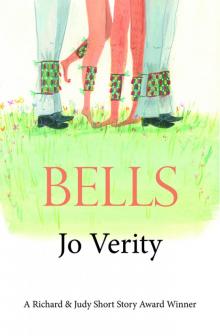 Bells
Bells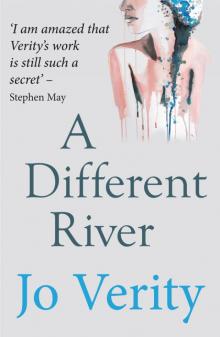 A Different River
A Different River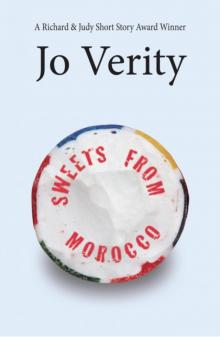 Sweets From Morocco
Sweets From Morocco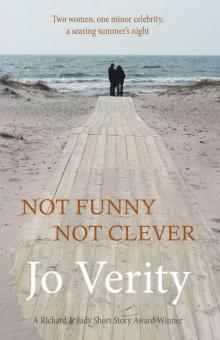 Not Funny Not Clever
Not Funny Not Clever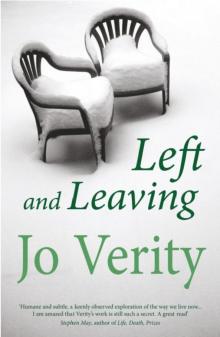 Left and Leaving
Left and Leaving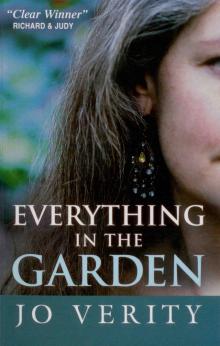 Everything in the Garden
Everything in the Garden